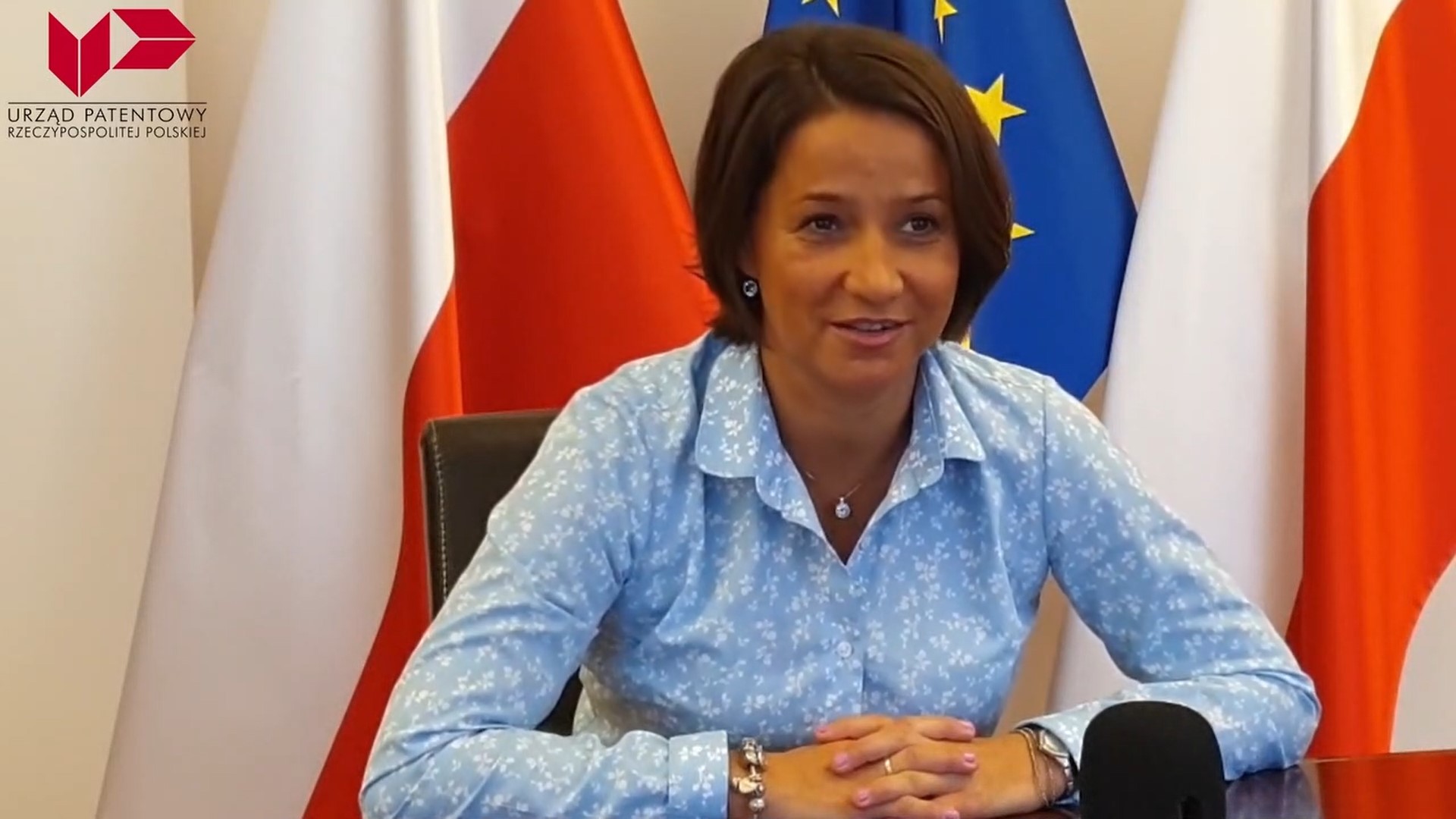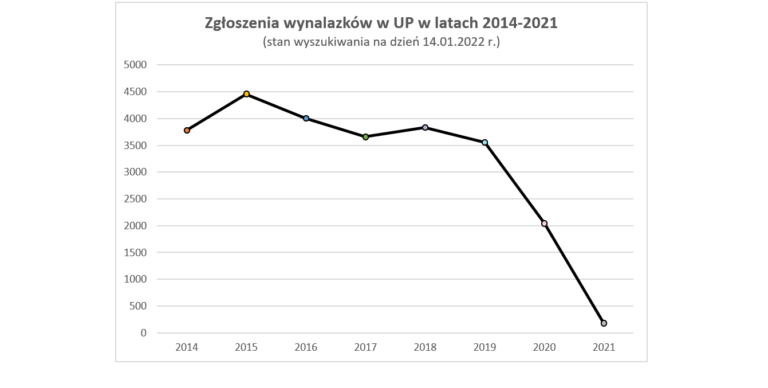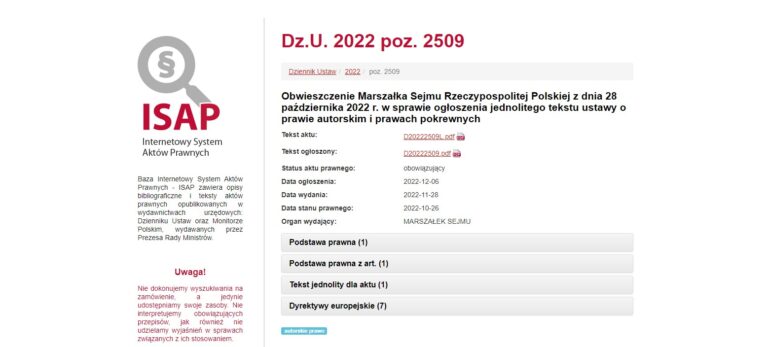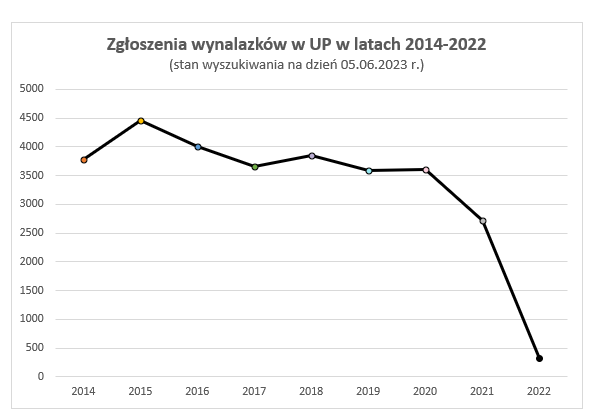TRANSLATION SOON – Edyta DEMBY-SIWEK – acting since 9th May 2019, and as of 14th September 2019, President of the Patent Office of the Republic of Poland.
From 2014 to 2019 – Director of the Trademark Department at the Patent Office of the Republic of Poland.
Stenogram rozmowy Edyty DEMBY-SIWEK, Prezesa Urzędu Patentowego RP – lato 2021
Dane podawane na stronie Urzędu Patentowego dotyczące obniżenia liczby zgłoszeń: link
2022 annual report of the Patent Office of the Republic of Poland – illustration of profligacy
Russian roulette that can be liquidated in 100 days
void
Russian roulette that can be liquidated in 100 days
Before we learned that the prosecutor’s office and the CBA (Central Anticorruption Bureau) were investigating pseudo-innovations and million-dollar grants from NCBiR (National Fund for Research and Development) competitions, another similar event in the world of intellectual property should have electrified public opinion.
At the end of 2022, a group of more than 100 MPs jointly filed three parliamentary interpellations demanding, among other things, an explanation as to why it happens that the Polish Patent Office gives us false or completely deformed information about the legal status of the rights it has granted.
I further provide an example of a strangely described patent worth many millions of PLN.
Very often the Office conducts proceedings as a result of which someone loses a fortune and someone else acquires it.
When erroneous or incomplete data is published – this is taken advantage of by people who are not comfortable with ethics. Unfortunately, they often work in professions of public trust and are eager to initiate lawsuits that the Polish justice system cannot handle.
That is why it is so dangerous when, after opening a website with the databases of the Polish Patent Office, we have to guess: “True or false?“, “Patented or not?“. Under these conditions, the free market game turns into a game of “Russian roulette“. Today, on the website of the Patent Office of the Republic of Poland, we come across information that a granted right has expired – although, in fact, it continues. The opposite also happens. We can find assurances that a particular right exists and we are not allowed to infringe it – while in legal terms it does not actually exist, because, for example, it has been invalidated.
We observe the puzzling practice of anonymisation.
At the same time, the Polish Patent Office is unable to present the judgments it issues.
Examples include, i.a., the Office’s booklet issued at the end of 2022, which published selected decisions of the Adjudicative Boards of the Polish Patent Office. This publication could actually be considered amusing if it were not for the fact that it really was published, it consumed certain resources, and its usefulness is limited to decorating the shelves in the offices of people who assure themselves that they are ‘professionals’.
In the introduction to the booklet – I do not know, seriously or in jest – the Director of the Department of Jurisprudence writes: “the study is yet another initiative taken towards transparency in the functioning of the office”.
Is the information provided by the Polish Patent Office understandable?
If we force ourselves to read the booklet of the Office – already reading the first of the set of (allegedly final) decisions makes us realise that only the case number, the date of its issuance and information on the composition of the Adjudicative Board, which checked whether the invention was rightfully patented (whether it was new on the date of application), are clearly presented here.
The rest of the information is merely coded information that can only be deciphered by people with above-standard, not to say supernatural, skills. The anonymised decision of the Polish Patent Office published in the brochure states:
“1) invalidate the patent entitled: ‘Valve with a head’ No PL(…); 2) award D. Sp. z o.o. with its registered office in G. from T.K. residing in W. the amount of x PLN (in words: x zlotys) as reimbursement of the costs of the proceedings in the case.”(. . .) . .
As evidence of the unpatentability of the invention at issue, the applicant submitted, together with sworn translations of foreign-language materials, duly authenticated: – patent description no PL(…) with priority of 25 May 2007, – patent description no DE(…) published on 5 August 1971, – patent description no US(…) published on 12 August 1986, – patent description no US(…) published on 5 November 1985, – patent description no US(…) published on 15 July 1986, – patent description EP(…) published on 19 December 2001, – patent description EP(…) published on 27 September 2000, – patent description DE(…) (only the original description without the first page), – patent description DE(…) published on 23 June 1994.”
A genius who spares no time or effort (and is also endowed by nature with a talent for detective work) will be able to determine from the title, reference number and date of the decision that these dots are the numbers of the protected and filed for protection solutions of Danfoss, whose Polish subsidiary is located in Grodzisk. Substituting guiding patent numbers by the dots was neither understandable nor necessary (after all, we do not suspect that the dots conceal phrases that violate good morals).
Value of cases decided by the Polish Patent Office.
This particular case to which the above-mentioned sad example from a recently published booklet describing a complainant from Walbrzych relates does not concern just a bicker. The court case documents show that several million in damages were claimed in this case. If, after almost 10 years, the Polish Patent Office is not able to reach a clear-cut solution to this type of dispute – it means that its operation is dangerous for all those against whom deliberate and calculated for institutional inefficiency “patent blackmail“ is sometimes used.
The operation of the Patent Office of the Republic of Poland is dangerous to all except large corporations, which can effectively stifle innovation and development of Polish entrepreneurs and exploit the weaknesses of the Patent Office of the Republic of Poland.
What is really at stake in this case? And what do we lose when this important and interesting information is blocked from us?
Well, by knowing the content of the decision, we would be able to understand why the Adjudicative Board assessed the situation in such a way and not differently. Only by knowing the details we would be able to critically analyse key patent decisions.
How has the world dealt with information that is kept secret in Poland?
Other databases in the world do not hide such data as described in the amusing booklet of the Polish Patent Office. They are not anonymised where researchers are engaged in patent practice and not in breaking the codes of their offices. You will not find a serious patent office in Europe that makes access to elementary information as difficult as the Polish one.
Why was the described methodology of presenting information adopted in Poland?
Well, the custom adopted helps to promulgate with impunity such untruths as were found in the three replies to three excellent parliamentary interpellations.
The concealment of data under the dots also provides an ideal breeding ground for dishonest participants in economic transactions who, by referring to information of the Patent Office which has nothing to do with reality, achieve their goals.
Why should each of us strive to ensure that the Polish Patent Office accurately informs us about the exclusive rights it grants and the decisions it issues?
We should all take an interest in the current state of affairs, because we just want to work peacefully, and false information made available by the Patent Office results in disputes that hit entrepreneurs and ultimately the entire market.
Today, accusations of infringement of industrial property rights are sometimes made against impeccably organised entrepreneurs, who think that it is enough that they do not infringe the law. They are not particularly interested in the fact that, in practice, the hype declarations of the Office have nothing to do with the clearly visible inertia and lack of concern for those who are the driving force of the economy. They should, however, be aware of how dangerous the current situation is, because while our forgiving smile may cause us to rectify incorrect data provided by the Polish Patent Office, no one wants their forehead muscles to constrict when it turns out that someone, citing incorrect data, launches a massive illegal attack.
What are we losing as a result of the state of confusion and unusual Polish practices, misinformation and lack of access to documents?
We are not only being deprived of knowledge. Entrepreneurs sometimes lose their life’s work during lengthy trials, and they always lose their time. This is one of the most dangerous forms of stealth theft, with severe consequences. I would like everyone to see the nonsense of the organised situation, which parodies the real world and translates into the disappearance of Polish innovation and the mediocre condition of our (common, after all) economy.
It also raises the question of whether we should currently trust the information provided by the Patent Office?
Today we have a problem when we want to find out whether someone’s invention is patented on the basis of data available on the Office’s website.
It is with regret and a certain embarrassment that I have to admit that a concern arises (let’s hope it is a faint one) whether the Polish Patent Office is currently unwilling or rather unable to properly inform whether the protection of a given solution is ongoing or not.
In order to determine whether the information presented on the website is true, if we do not want to play the “Russian roulette”, the only thing left to do is to flip a coin.
Instruments that just need to be used.
I do not speak on subjects closer to others, but as the person who has so far headed the Polish Chamber of Patent Attorneys for the longest time in its history (and together with friends has put the institution in an excellent order) – I know exactly and will gladly explain what needs to be changed in the Polish Patent Office to make it work properly. After all, it does not have to provide erroneous data and can keep up to date on the decisions made in each case.
Of course, this task is not easy. It requires a plan that is well consulted with stakeholders.
However, I would argue that a lot can be achieved almost immediately. Already in the famous first 100 days, changes can be made that do not require strategic structural adjustments or a new system of promotions and recruitments. It is enough to present the information available to the Polish Patent Office in a different way, because for several years it has been using the same patent database software systems for archiving its documentation as those used by the EPO (European Patent Office) and the national offices of the European region. The world’s most popular patent information system collects sets of documents relating to the handling of millions of invention applications – so it is sufficient to make them available.
In 100 days, the Patent Office can rectify an erroneous practice.
In Poland today, access to such national documents is centrally blocked, despite the fact that we are, after all, bound by the same rules adopted throughout the EU (access to public information and protection of personal data). However, it would take no more than a few weeks for the President of the Patent Office of the Republic of Poland to take a healing decision to make the correct data available, so that this system, which speeds up work, could also be put into operation in Poland.
I think that if only there was a will to do so, it would be possible to organise the Polish Patent Office in such a way that no entrepreneurs would ever again be visited by policemen in balaclavas ordered by confused superiors to enforce alleged rights granted by the Polish Patent Office.
The current management of the Office seems to have other priorities for the time being. It is focused on building relationships and assuring us of its successes and that it provides assistance to entrepreneurs.
Sympathetic declarations distract us from the mistakes made, but they will not erase bad practices. Therefore, we all need changes made in 100 days.
The author, Anna KORBELA, passed the judicial exam in 1994. In 1996, she was entered on the list of attorneys-at-law of the Opole Bar Association of Attorneys-at-Law (no. 364/96), and a year later on the list of patent attorneys kept by the Patent Office of the Republic of Poland (no. 3040), as well as on the list of European Patent Attorneys kept by the European Patent Office (no. 137760). She is also a professional representative before the EUIPO (European Union Intellectual Property Office; no. 27595) and has been authorised to act before the DPMA (Deutsches Patent- und Markenamt – German Patent and Trademark Office; no. 38701324), representative before the UPC [Unified Patent Court].
She served as President of the Polish Chamber of Patent Attorneys from 2019-2013 and 2013-2017.






